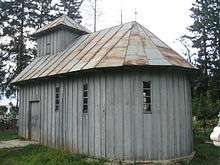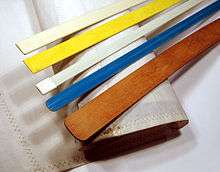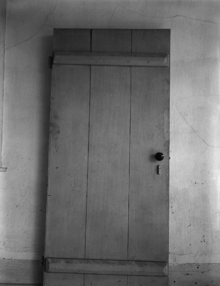Batten



| Look up batten in Wiktionary, the free dictionary. |
Batten has multiple meanings in construction and shipbuilding but is generally a strip of solid material, historically made from wood[1] but can also be made from plastic, metal, or fiberglass. In a sense used in flooring a batten may be relatively large, up to 2.5 inches (6.4 cm) thick by 7 inches (18 cm) wide and more than 6 feet (1.8 m) long.[2]
In the steel industry, battens used as furring may also be referred to as "top hats", in reference to the profile of the metal.
Roofing battens
Roofing battens or battening, also called roofing lath, are used to provide the fixing point for roofing materials such as shingles or tiles. The spacing of the battens on the trusses or rafters depend on the type of roofing material and are applied horizontally like purlins.
Battens are also used in metal roofing to secure the sheets called a batten-seam roof and are covered with a batten roll joint.[3]
Some roofs may use a grid of battens in both directions, known as a counter-batten system, which improves ventilation.
Wall battens
Wall battens like roofing battens are used to fix siding materials such as tile or shingles. Rainscreen construction uses battens (furring) as part of a system which allows walls to dry out more quickly than normal.
Battens as spacers
Battens may be used as spacers, sometimes called furring, to raise the surface of a material. In flooring the sometimes large battens support the finish flooring[4] in a similar manner to a joist but with the batten resting on a solid sub-floor as a floating floor and sometimes cushioned.
Batten trim
Batten trim or batten molding is a thin strip of trim, typically with a rectangular cross-section, used to cover seams between panels of exterior siding or interior paneling.
Board-and-batten
Board-and-batten siding is an exterior treatment of vertical boards with battens covering the seams. Board-and-batten roofing is a type of board roof with battens covering the gaps between boards on a roof as the roofing material. Board-and-batten is also a synonym for single-wall construction, a method of building with vertical, structural boards, the seams sometimes covered with battens.
Batten doors

In door construction battens may be used to strengthen panels made up of multiple boards, as in a batten door, or to cover joins.
Battens for wall insulation
Battens are used for solid wall insulation. Regularly spaced battens are fitted to the wall, the spaces between them filled with insulation, and plasterboard or drywall screwed to the battens. This method is no longer the most popular, as rigid insulation sheets give better insulation (with battens bridging the insulation) and take less time to fit.
Screed batten
In concrete work a screed batten is fixed to the formwork to smoothly guide a screed.
Battens in sailing
In sailing, battens are long, thin strips (usually fiberglass or some similar material nowadays, but historically wooden) used to support the roach of a sail. They are also used on tall ships to form the ladders up the shrouds in a fashion similar to ratlines. They are also used to help secure tarpaulins over hatches, thus giving rise to the common phrase "batten down the hatches!", meaning to secure the hatches against an approaching storm. Used by analogy in non-sailing contexts, it means to prepare to weather a coming storm, whether that storm is metaphorical or literal.
References
- ↑ Whitney, William Dwight. "Batten, N.2." Def. 1. The Century Dictionary. Vol. 1. New York: Century, 1889. 476. Print.
- ↑ "batten, n.1". def. 1.a. Oxford English Dictionary Second Edition on CD-ROM (v. 4.0) © Oxford University Press 2009
- ↑ PDF illustrations of a batten being covered with a batten roll joint Archived April 16, 2014, at the Wayback Machine.
- ↑ Davies, Nikolas, and Erkki Jokiniemi. "flooring batten". Dictionary of Architecture and Building Construction. Amsterdam: Elsevier/Architectural, 2008. 156. Print.